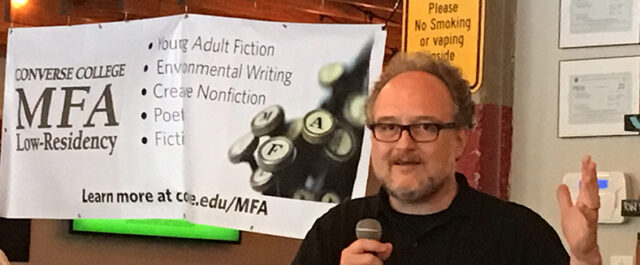A.J. Howells
We carelessly toss around adages without questioning their implications. “What doesn’t kill you makes you stronger” is perhaps the best one. I can imagine plenty of grotesque situations where this wouldn’t apply. For reference, read Dalton Trumbo’s 1939 anti-war novel (and future Metallica hit) Johnny Got His Gun. Or take “Slow and steady wins the race.” It’s oddly specific to a situation with a cocky rabbit and a dogged turtle, but it would never apply to the high school track star attempting to beat Usain Bolt’s miraculous qualifiers. Then there’s “Everything happens for a reason.” Maybe, but the reason isn’t necessarily a good one.
These three pieces of greeting card rubbish aren’t dangerous so much as comical. There is, however, a saying creative writing teachers have tossed around so long, it’s rare to question it. For me, it can feel dangerous when applying this advice to my own writing, though I recently tried.
“Write what you know.” Where’s the harm in that?
I almost never write stories about my career, which is that of the public-school teacher. I’ll occasionally journal about work, but I avoid formally writing about it, not because I don’t have any good stories, but because I forcefully put distance between my educator life and my writer life. I’m more likely to write about the menial, low-paying jobs I drudged through before landing a career. With those stories, I’m not writing what I know so much as I’m writing what I have known. This might sound like semantic nit-picking, but there is a distinct difference between the two. Writing what you know forces you to confront your current circumstances, whereas writing what you’ve known illuminates how the past has shaped the present. If I were still flipping burgers and dodging angry customers’ flying sandwiches (yes, this actually happened several times), I wouldn’t want to remind myself I’m heading back to that particular brand of hell the following day. But with almost ten years of distance, these stories now make me laugh instead of drink.
I understand the opposite. For many, the best writing comes from the most trying circumstances. Henry Miller wrote about living hand-to-mouth in Paris while living hand-to-mouth in Paris, and his reflections on this time period in his elder years often fall well-short of the original mark. Also consider Ernest Hemingway and Sylvia Plath. Then consider their how they died.
As a clinically depressed writer (read: A Walking Cliché), keeping a distance between my writing and my teaching stories curbs my condition because my teaching stories are the most depressing ones, the good ones anyway.Sure, they could add up to a great roman à clef, but they’d also make for a slew of difficult nights, counterproductive to several years of treatment.
Not writing about teaching is also a way of avoiding the title of “Educator” subsuming my identity. “Educator” is a coat I wear, and I love the coat. It has served me well over the past decade, and it has helped me impact a lot of lives. To navigate life, I need a good coat, but when I get in the car and drive home from work, the sweat builds. I stop at a red light and try to quickly take my coat off, only to find myself with an arm still inside. It can be tough to leave the trials of a school day behind, but by the third red light, my coat is completely off and crumpled in the back seat. This is when I can finally crank the Funkadelic and just focus on driving. When I get home, I don’t put my coat back on—that would be absurd. I don’t take it to bed with me either, but in the morning, it’s there to embrace and accompany me to the workday.
My apologies for overextending my metaphor. I know you get the point, but please allow me one final extension.
There are plenty of people out there who never remove their coats, and while they look ridiculous (they shower with them, for Christ’s sake), they lack self-awareness and instead tell me I look ridiculous for taking mine off. They plead with me to put it back on. They shame me for my naked freedom. They blog about their jobs. They write what they know. You do not want to get stuck at a dinner party with these people.
It can be easy to fall into the trappings of their professional peer pressure. It’s like deleting your social media accounts or becoming a vegetarian: what difference, really, are you making for the good of society? But consider Ancient Zen master Eihei Dogen’s advice from thirteenth century Japan. A couple years back, contemporary Zen master Brad Warner paraphrased essays from Dogen’s Shobogenzo into modern vernacular. In the title essay of Warner’s Don’t Be a Jerk, he states, “Even if the whole universe is nothing but a bunch of jerks doing all kinds of jerk-type things, there is still liberation in not being a jerk.” Even if the whole universe is nothing but a bunch of workers refusing to remove their coats, there is still liberation in removing your own. Throw yourself a lifesaver, even if the people around you don’t want to be saved.
Despite all this, I recently dipped into my well of teaching stories and typed one up just to see if I could do it.The piece is being published this month, and I’m proud of it. At risk of sounding cliché, writing is liberating for me, and I tend to savor every second of writing a short story, journal entry, blog post, poem, grocery list, etc. I love typing this current sentence, yet there wasn’t a single sentence of that teaching story I enjoyed writing. It was a sad story about a sad student whom I constantly worry about. Needless to say, it was the last time I’ll be writing what “I know” for quite some time, but it won’t be the last. When I can bear it again, I’ll write what I know. Until then, I’ll continue to ignore the advice.
 A. J. Howells is the publisher and general editor of Makeshift Press (MakeshiftPress.org), publisher of Fredric Brown’s The Office. A. J.’s prose has appeared in The First Line, Rhetoric Askew, and two volumes of Workers Write. RhetAskew Publishing will soon release his horror-comedy novella Alley Bats, and his poetry has been featured in Eunoia Review and The Offbeat. He lives with his wife, two children, and two cats in the woods of northern Virginia where he spends far too much time reading comic books and listening to Sun Ra. In his spare time, he teaches full time.
A. J. Howells is the publisher and general editor of Makeshift Press (MakeshiftPress.org), publisher of Fredric Brown’s The Office. A. J.’s prose has appeared in The First Line, Rhetoric Askew, and two volumes of Workers Write. RhetAskew Publishing will soon release his horror-comedy novella Alley Bats, and his poetry has been featured in Eunoia Review and The Offbeat. He lives with his wife, two children, and two cats in the woods of northern Virginia where he spends far too much time reading comic books and listening to Sun Ra. In his spare time, he teaches full time.
Featured Image Photo Credit: Photo by NeONBRAND on Unsplash



 Lisa Hase-Jackson, who has served South 85 Journal in the past as its Review Editor, brings a wealth of experience to the role of Managing Editor. She is the author of the recently published poetry collection Flint & Fire, selected by Jericho Brown for the 2019 Hilary Tham Capital Collection. Her poetry has appeared in such journals as The Midwest Quarterly, Kansas City Voices, The South Carolina Review, among others. Born in Portland, Oregon, and raised primarily in the Midwest, she has lived and taught in such cities as Seoul, Albuquerque, and Kansas City. She completed her BA at Washburn University, her MA at Kansas State University, and her MFA at Converse College. She currently lives in Charleston, South Carolina, where she edits Zingara Poetry Review, and teaches creative writing and honors courses at the College of Charleston.
Lisa Hase-Jackson, who has served South 85 Journal in the past as its Review Editor, brings a wealth of experience to the role of Managing Editor. She is the author of the recently published poetry collection Flint & Fire, selected by Jericho Brown for the 2019 Hilary Tham Capital Collection. Her poetry has appeared in such journals as The Midwest Quarterly, Kansas City Voices, The South Carolina Review, among others. Born in Portland, Oregon, and raised primarily in the Midwest, she has lived and taught in such cities as Seoul, Albuquerque, and Kansas City. She completed her BA at Washburn University, her MA at Kansas State University, and her MFA at Converse College. She currently lives in Charleston, South Carolina, where she edits Zingara Poetry Review, and teaches creative writing and honors courses at the College of Charleston.